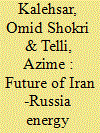| Srl | Item |
| 1 |
ID:
155566


|
|
|
| 2 |
ID:
174663


|
|
|
|
|
| Summary/Abstract |
Oil and gas resources and their transit routes are key sources of international power and tools of foreign policy, used not only to develop relations with other countries but to maintain regional peace and stability. However, the United States seeks to weaken energy‐rich countries through sanctions to achieve economic and political goals. Hence, the need has arisen to establish competitive plans to secure energy supplies and provide security to industrialized importers during oil shocks. The main goal is to ensure a sustainable energy supply for industrialized nations and regulate international affairs.
|
|
|
|
|
|
|
|
|
|
|
|
|
|
|
|
| 3 |
ID:
146068


|
|
|
|
|
| Summary/Abstract |
Energy relations between Iran and the Republic of Azerbaijan go back to the 1990s, after the collapse of the Soviet Union. Before Azerbaijan gained its independence, direct economic relations between the two were impossible. Once the leadership of Heyder Aliyev emerged as uncontested, however, the first energy agreement between the two countries was signed. Azerbaijan, with huge oil and gas reserves, began to present itself as a key ally in the European energy market, partly by retaining an interest in having a potential role in the southern gas corridor. At the same time, Iran — holding the largest natural-gas reserves in the world and the fourth-most-abundant proven oil reserves — has been planning to take its rightful share in the world energy market, primarily as a major natural-gas exporter.
|
|
|
|
|
|
|
|
|
|
|
|
|
|
|
|
| 4 |
ID:
169592


|
|
|
|
|
| Summary/Abstract |
Today, with the international drive to reduce fossil‐fuel consumption and increase the possibilities of sustainable development, the use of new and renewable fuel is being explored with vigor. Considering the potential for renewable energy in Iran, the development of these valuable resources is justified to achieve sustainable development goals: economic growth, social welfare, the improvement of quality of life, and the security of society.
|
|
|
|
|
|
|
|
|
|
|
|
|
|
|
|